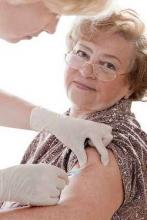Adults aged 65 years and older should receive both a conjugate and polysaccharide vaccine against pneumococcal pneumonia, according to a new federal proposal.
By a vote of 13-2, a working group of the Advisory Committee on Immunization Practices agreed that a combination of the pneumococcal 13-valent conjugate vaccine (PCV13) and the 23-valent polysaccharide vaccine (PPSV23) will provide the most complete protection for older patients.
For those who have never been vaccinated against pneumococcal pneumonia, or who aren’t sure of their vaccination status, the preferred sequence would be PCV13 first, followed by the PPSV23 vaccine within a minimum of 6-12 months – although that time frame should be considered a very flexible one. But the recommendation also accommodates people who have already had either vaccine, experts advised at a meeting of the Centers for Disease Control and Prevention’s Advisory Committee on Immunization Practices.
Those who have had PCV13 should get the PPSV23 within the 6-12 month framework if possible; the two vaccines should not be coadministered.
Those who have been vaccinated with PPSV23 only should receive the PCV13 at least 1 year later. High-risk patients who require an additional dose can receive another PPSV23 6-12 months after PCV13 vaccination.
The recommendation will be passed on to the full committee at its meeting in late October. It was made in a special interim meeting, during which the committee considered evidence provided by the randomized, controlled CAPITA study, and additional information on how herd immunization effects in younger people could impact the vulnerability of older people.
Although the clinical recommendation was made by a body of the Centers for Disease Control and Prevention, the federal body controlling reimbursement has extant policies that could limit its practical implementation. Medicare currently pays for only one pneumococcal pneumonia vaccine for adults aged 65 years and older. Although the Centers for Medicare & Medicaid Services (CMS) would consider amending that if the recommendation is adopted, any change would not be quick, a representative said.
"If CMS decided to go with a change in coverage for a two-shot regimen, that does take time," said Dr. Joseph Chin, medical officer for the agency’s Coverage and Analysis Group.
In most cases, the initial topic is addressed at the beginning of the year, followed by a period of public comment.
"The final okay is typically given in November, and the change is effective in January," Dr. Chin said.
Results of the CAPITA study, sponsored by Pfizer, which manufactures the vaccine, were released in March.
It concluded that the PCV13 vaccine offered significant protection against community-acquired pneumonia caused by strains in the vaccine, with 45% fewer episodes than in those who got the placebo.
There were also 45% fewer first episodes of nonbacteremic and noninvasive pneumonias and 75% fewer first episodes of invasive pneumonia, compared with placebo. The safety profile was good, and, according to the working group, the cost/benefit analysis is in line with other treatments that are considered cost-effective.
None of the committee members had any personal financial disclosures.


